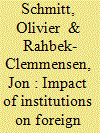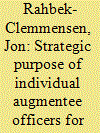| Srl | Item |
| 1 |
ID:
152546


|
|
|
|
|
| Summary/Abstract |
Even though France is an active player on the world stage, its foreign and security think tank milieu is smaller than that of similar powers, most notably the United Kingdom. Comparing French think tanks with those in Denmark illustrates how French institutional structures constrain think tank activities. France’s political tradition of centralisation, its non-academic civil service education, and separation of academia and administration create an environment in which think tanks are underfunded and walk a fine line between an over-controlling administration and a suspicious academia. Some French think tanks perform well in spite of these structures, which indicates that they could flourish and compete at the highest international level if given better structural conditions.
|
|
|
|
|
|
|
|
|
|
|
|
|
|
|
|
| 2 |
ID:
170273


|
|
|
|
|
| Summary/Abstract |
This article examines the strategic purpose of Individual Augmentee Officers (IAOs) for junior partners in multinational military operations through an exploratory case study of Danish IAOs in Iraq and South Sudan between 2014 and 2017. IAOs are individual officers who are moved from their normal functions to be seconded to other units of the armed forces of their own or another country or an international institution. The study concludes that IAOs function as strategically important, yet not necessarily indispensable, supplements to military contingents in several ways: making tangible contributions to the overall mission (contributing), gaining access to information, knowledge, and experience (learning), and lobbying decision-making processes within mission headquarters (lobbying). The usefulness of IAOs depends on whether the junior partner has specific interests and a significant presence in the theatre and whether the mission is conducted as a UN mission, a NATO mission, or an ad hoc coalition.
|
|
|
|
|
|
|
|
|
|
|
|
|
|
|
|